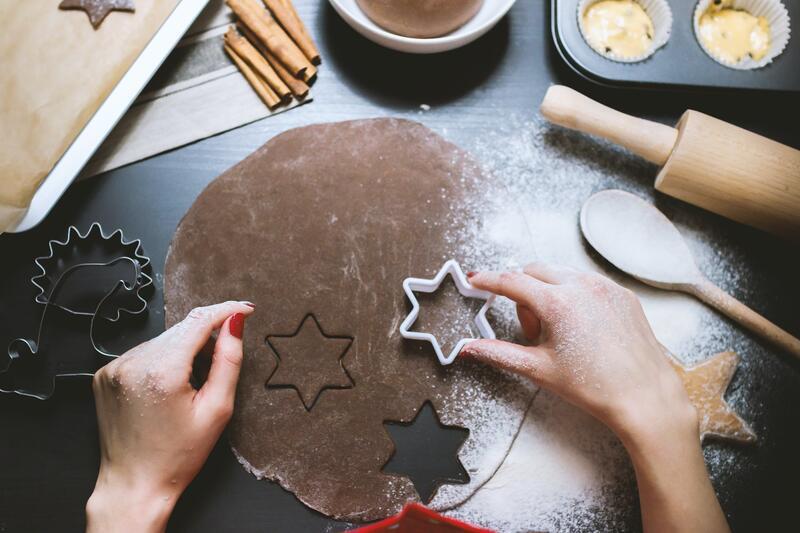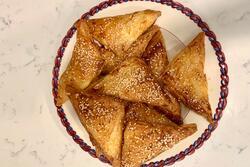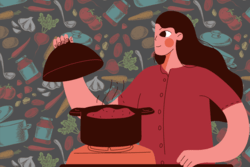Experimenting in the Kitchen Helped Me Cope with COVID
When I was a teenager, and had newly discovered feminism, I decided it was unfair that my mother both worked full time and cooked for my family most evenings. I proposed that each of us—my father, brother, and I—cook dinner one night a week to give my mom a break. While I couldn’t replicate my mother’s five-star cooking, when the meal was my responsibility, I liked to make pastas and Indian food with interesting spice combinations. One-pot soups and stews were my speciality, and I enjoyed experimenting with flavors not usually found in my mother’s cooking. As an adult, this style of cooking stuck with me. I didn’t like to spend too much time or effort cooking, so I continued to make basic, hearty, mostly vegetarian meals, and my baking habits were similarly simple.
But during the pandemic cooking and baking became a reliable coping mechanism, and I finally branched out and started cooking more complex recipes, expanding my repertoire to include chicken dishes, fish entrees, and desserts. I also reconnected with my mother’s cooking and learned to make some of her recipes. To my surprise, experimenting in the kitchen helped me overcome the boredom and grief over the losses of COVID-19, even if just for a meal.
The mundanity that the pandemic introduced to our lives—working and learning from home without access to community and most kinds of entertainment—was alleviated through cooking. On Sundays, I’d pore over the recipes in The New York Times “At Home” section, challenging myself to make something new or different each week. At the beginning of the pandemic, my favorite dish was the site’s risotto with kale and peas. One week, I was excited to see that they had a whole section devoted only to desserts, and I learned to make lemon squares with olive oil and sea salt from scratch, creating a pat-in shortbread crust and then heating egg whites, fresh lemon, and butter to make the tangy lemon curd. The delectable results were worth the extra time it took to create these dishes. I brought my mother a small package, and she pronounced the lemon squares to be the best she’d ever had, making me feel proud.
Gradually, by studying cookbooks and searching for recipes online, I learned to make new things and cater to my family’s various diets. My partner loves meat, but is gluten-free, and our daughter is vegetarian. One of my favorite resources was the vegan cookbook Oh She Glows for Dinner by Angela Liddon, from which I learned to make a creamy Caesar salad dressing with cashews and capers instead of eggs and anchovies and gluten-free peanut-butter chocolate chip cookies. In a time of chaos, feeding my family and eating together was something I could rely on, something consistent. Cooking brought a sense of stability to our time together and soothed our anxiety.
As I became more proficient in the kitchen, I also began trying to recreate my mother’s recipes, which helped me feel close to my parents, despite the distance. Prior to the pandemic, my family often went to my parents’ house for Shabbat dinner. Over the dinner table, we would catch up on our weeks while eating my mother’s multi-course meals. On Shabbat, she always made two kinds of soup—chicken and vegetarian—and a main course, a salad, one or two side dishes and several desserts. At the beginning of the pandemic, we tried to connect by eating together outdoors on Shabbat, but the colder weather brought an end to this routine. While we continued meeting over Zoom to say the blessings, we ate our meals alone. Sometimes, my mother would bring us small packages of leftover dishes and desserts, still wanting to nurture us.
Shabbat and holidays just didn’t feel the same without family around us, and recreating my mother’s dishes helped me grapple with this break in tradition. I started with my mother’s schnitzel and tomato soup recipes. The first time I made them, the smell of the soup simmering on the stove filled the house with warmth and evoked the presence of my mother, reminding me of Shabbat dinners at her house. Over the phone, my mom instructed me as I strained the onions and celery from the soup. “Dad likes to eat the cooked onions, and I eat the celery,” she explained. She insisted the recipe called for kosher cooking sherry, which I couldn’t find anywhere, so I made due with an expensive sherry I splurged on at the local liquor store. I’d never known that it was the mix of onions, celery, cloves, sherry, and lemon that gave my mom’s tomato soup its delicious flavor. And the aroma, combined with the experience of making the dish with my mother—together, yet apart—brought me back to the sensation of sitting at her dining table. When my daughter lapped it up, I felt like I understood my mother’s need to cook for us, and the joy she experienced when we liked her food.
For me, cooking during the pandemic has become a mode of self care and a way to connect with my family, loved ones, and heritage. It has allowed me to create new rituals that have brought stability and fun to my household. Making foods I associate with my parents and traditional Jewish holidays evokes their presence and the comfort of family at a time when we are all socially distanced. Hopefully, one day soon, I’ll be able to eat at my parents’ dinner table again, but in the meantime, I have gained a repertoire of traditional and not-so-traditional recipes and become a better cook.








Enjoyed this piece—I could really relate. I feel the same making my mother’s sweet and sour meatballs as you do making your mother’s tomato soup.
Wonderful, evocative article. You captured the spirit of cooking and of the meals in our house.